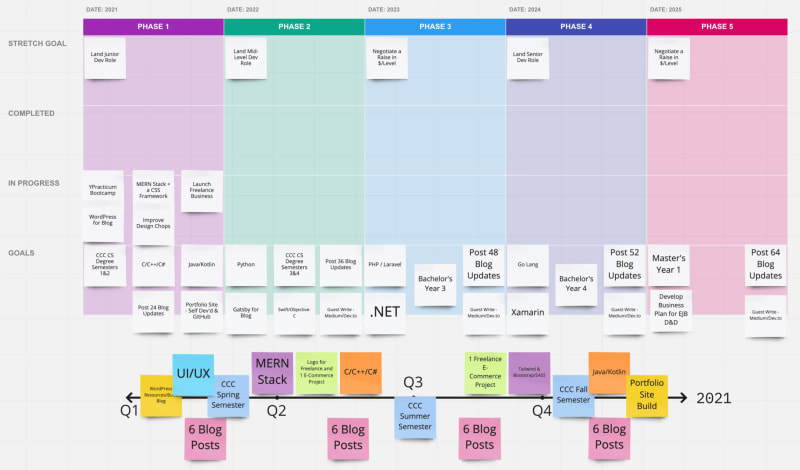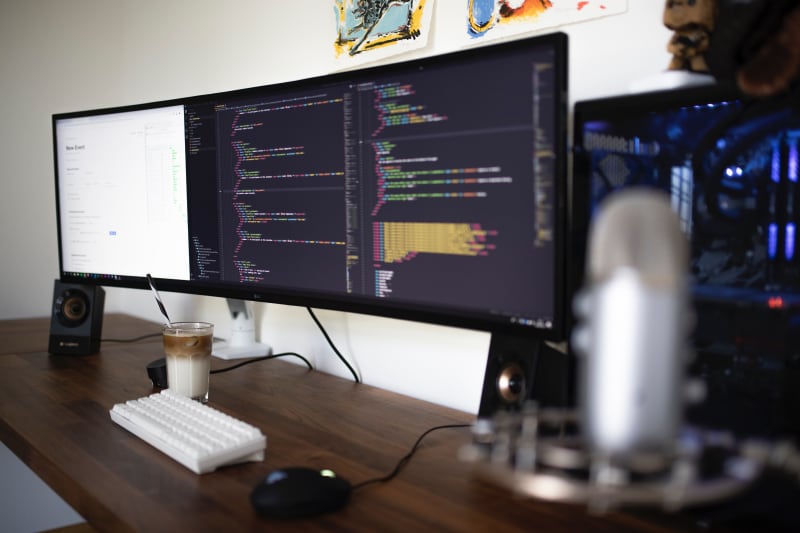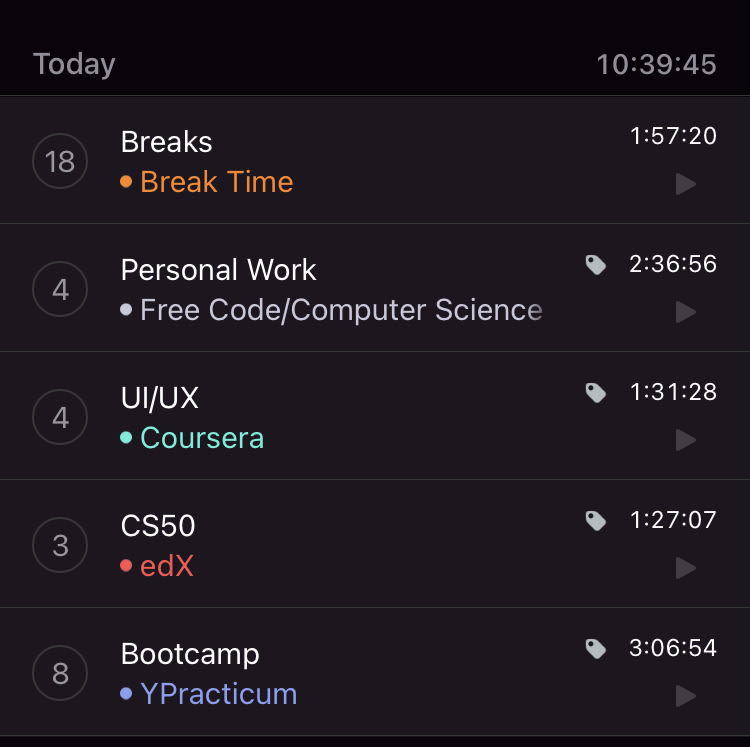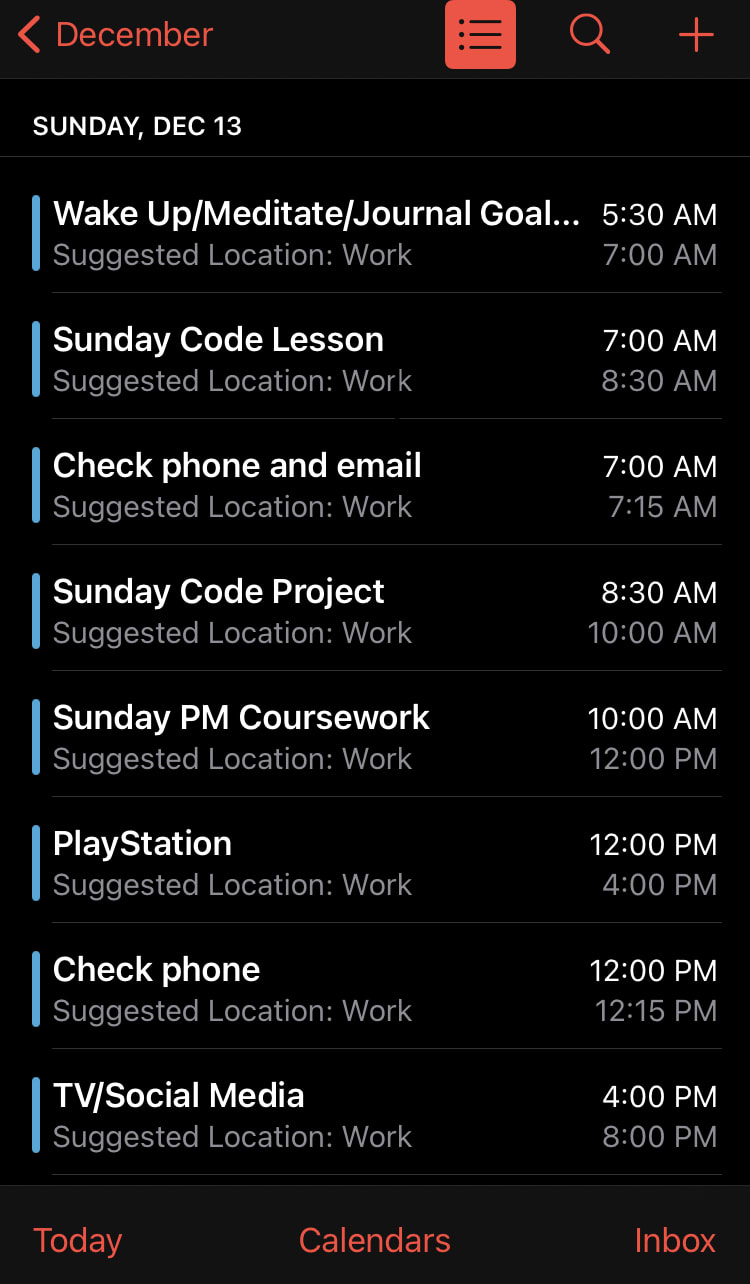Intro
Over the holidays I got busy with some new free software for productivity and planning and I made this thread post on Twitter:
I decided to expand on it a bit here to start the New Year.
Process with Miro
In my web development bootcamp, right as we got started we had an ice breaker activity collaborating through the whiteboarding tool Miro. I liked how easy it was to use for a group of two dozen people and it seemed like it had the functionality I was looking for (to build a timeline), so I looked it up. It was free!
I downloaded the desktop version for my Mac and signed up; a painless process that took no more than five minutes. Once I was registered I did some looking around at the templates, there's several that appear helpful in the development/project management space (Kanban, wireframing, User Story Maps, flowcharts etc) but the ones I used for my planning were labeled simply as "Timeline" and "Timeline 2". They're quite easy to find; after you begin to create a board you can just start typing "timeline" in the search bare and they'll pop right up!
I found that the UI was intuitive and I haven't looked up any tutorials for it as of this post, I've done everything by touch and feel and came up with the below for my New Year's goals in development.
Timeline Structure: Why 5 years?
As mentioned in the caption, the approach I took was to break out a "5 year plan" with the "Timeline" template. I'm honestly not sure that I decided to do this consciously, so much as I just had the cliche interview question in my head when I was thinking about goals. In any event, now I can be honest and tell interviewers that I really do have a five year plan! 😎
I knew I planned on getting more specific with 2021, just because I had a lot of ambitions I wanted to document and it was the closest in the timeline so the goals were more clear. Before I broke down my 2021 timeline in the "Timeline 2" template, I mapped out the next 5 years across the following sections:
- Goals
- In Progress
- Completed (nothing there yet!) and;
- Stretch Goal
Once I had the high-level view more or less finalized, I decided to color code 2021 with consideration to the following categories:
- College
- Blogging
- Coding Languages
- Learning Concepts and Skills
- Freelance Projects
When I was building the high-level view I was starting to run out of space in 2021, which is another reason I built out more years. This allowed me to spread out some of the goals as a way to ensure I didn't take on too much this year. I tried my best to keep 2022 onward limited to about 20-30% less tiles so that I had some breathing room for life's circumstances, but I'm a bit of an over achiever😅🤷🏻♂️
Goal Vision
A big factor I'm trying to incorporate into my process/life/structure is to #LearnInPublic. Because of this, I decided to make a publishing target for my blogging activity.
When it comes to my coding efforts specifically, I started on the self-paced study path then, enrolled in bootcamp right after I started university for Computer Science. You could say I'm taking the "shotgun approach" now! Because of this varied study path, I have many languages I'm going to try and experience.
I chose my core tech stack based on the bootcamp curriculum since that's more focused to current trends, is ongoing for the next 10 months and has less breaks (than university). We're studying the MERN stack.
The extra languages are coming from the courses I know I'm taking this year for university, but I had some personal interests that I've incorporated into 2022 and onward as an effort to stay fresh and versatile post-bootcamp.
In terms of blogging, I write personally every day in a journal and I truly enjoy it. That said, I started small for my blog post annual goals just based on what my time commitments look like between university and bootcamp. As those factors layer off, I plan to step up my productivity stretching from a post every 2 weeks at the start, to 1-2 per week near the end of the 5 years. Some of you may find that minimal, but that's the point. I wanted to be sure I could meet (and maybe exceed) my goals starting out; otherwise, why try?
Workflow and Implementation
Many wise folks have said much more memorable things about the benefit of planning and preparation, so I will spare you my witicisms. Just know, that I agree with the advocates of being prepared. That said, how will it get done?
I use other tools in my workflow to help me break down this year's goals to a monthly/weekly/daily level. Specifically, I have a card for each month built out on a Trello board (Kanban-style). If you haven't heard of Trello then check them out here - I'm using the free desktop version just like with Miro.
Now that I have my months fleshed out with weekly goals in a card (checklist feature in the app), every Sunday I break out daily cards to plan my week's efforts. Each day gets a time deadline to have all the checklist marked complete.
For my daily workflow, I'm applying the Pomodoro methodology for deep work targets and doing that in conjunction with my calendar. I have a routine I try to follow each weekday and a routine that is unique to each Saturday and Sunday.
I track my time with a combination of a manual Pomodoro timer on my phone and the use of Toggl to categorize where I'm spending my time. Then I compare it to my planned routine.
I'm not using any tool for these routines other than manual blocking time in my iCalendar, but if you're interested in other tips/tricks/tools for productivity have a look at this post on Medium. I'm considering building my routines into an app that's recommended from Ro, the author, who writes about it there.
As you can see above, I track my break time in part due to the Pomodoro methodology which emphasizes 25/50 minutes of deep work followed by a 5/10 minute break (depending on preference mostly) and then every 3 or 4 Pomodori (the term for more than one Pomodoro cycle) you take a longer break (maybe 25-30 minutes). The other reason I track my break time per day and plan a rest day is simple: if I didn't plan it out then it wouldn't happen! Have I mentioned I like to over achieve?😂
Conclusion
In 2020, I quit my job and decided to make learning to code my new career and the efforts therein have become my new job in the meantime. Have I always been this dedicated and focused? Absolutely not; it's necessary for me to have livelihood supported by work in tech.
Will this all work out as it's planned? Also, no; but, that's not my point in doing all this. Being prepared to reach my goals also means being prepared to make mistakes. If I didn't plan out what I wanted to accomplish then I wouldn't know what I can say yes or no to when it comes to the use of my personal time. This process gives me peace of mind and that's hard to come by.
Thanks for reading! If you enjoyed this article...
Feel free to comment below and share what you liked most, or any tips you have from your own productivity workflow!
Or, feel free to follow me on twitter and say hello🤘🏻😎🤘🏻









Top comments (0)